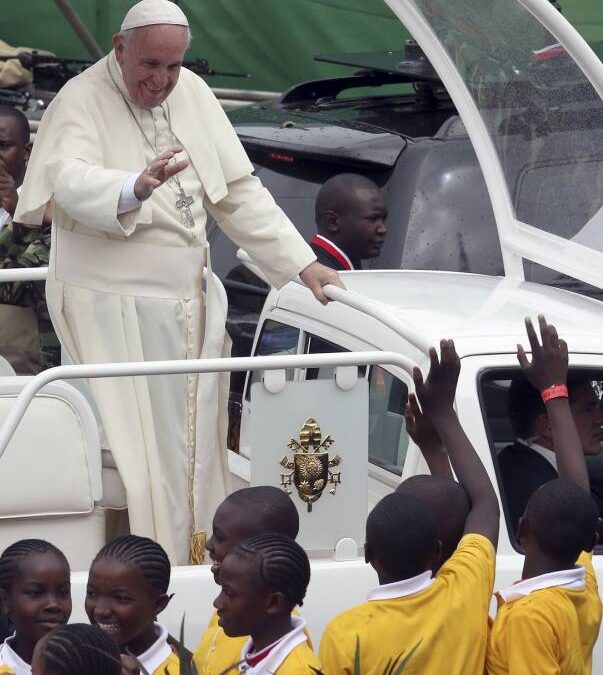
Nov 28, 2015 | Focolare Worldwide
“Karibu Kenya Papa” (Wel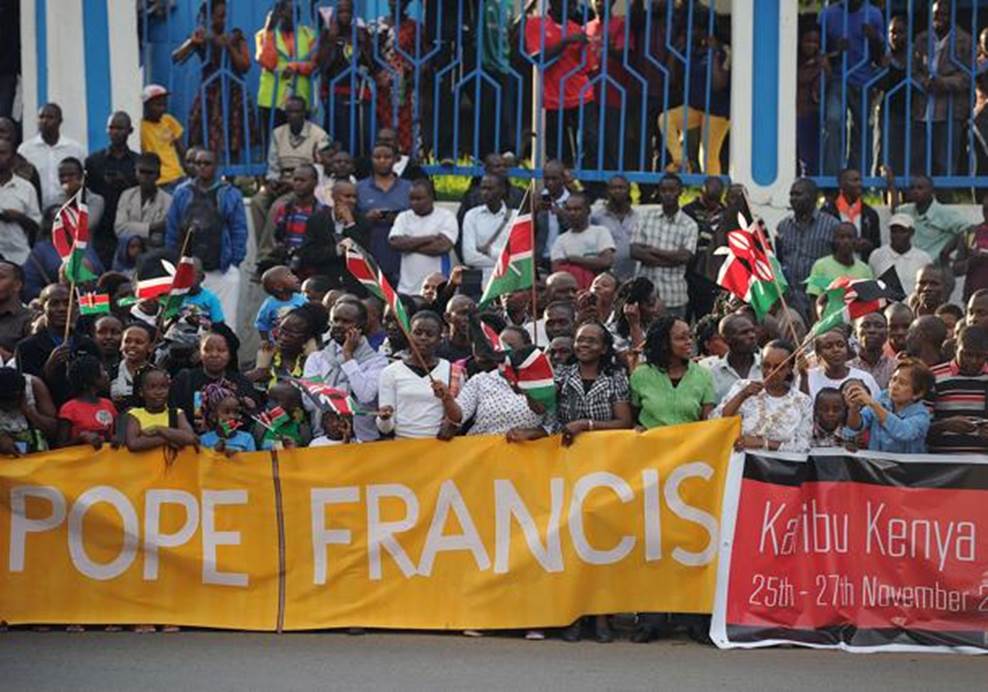 come to Kenya, Pope). Amid festive songs and dances, the Pope landed in Nairobi in the afternoon of 25 November for the first leg in Africa. From the airport and all the way to the city, two waves of crowds accompanied the papal automobile: a simple grey car. In his first greeting Francesco expressed his love for this “young and vigorous nation, a community enriched by diversity.” “Kenya has been blessed, not only with immense beauty in its mountains, rivers, lakes, forests, savannahs and semi-deserts, but also with an abundance of natural resources.” He went on to say: “In a world that continues to exploit instead of protecting our common home,” I hope that your values inspire “the endeavours of the government in promoting models of responsible economic development.” The papal agenda is full: the meeting with the clergy, to whom he gives three key words, weep, pray, and serve; and the session with the UN representatives of Nairobi, from whom he asked for a ”change of direction” so that economy and politics could be placed at the service of the person, in order to eradicate malaria and tuberculosis, be persistent in fighting against deforestation, and target fair trade and development which takes the poor into account. The meeting with the leaders of the various Churches and Muslim and Animist communities was highly significant, and where he affirmed that ecumenical and interreligious dialogue is not a luxury or an option. He then strongly stressed that phrase which echoed throughout the world: “The holy name of God must never be used to justify hatred and violence.”
come to Kenya, Pope). Amid festive songs and dances, the Pope landed in Nairobi in the afternoon of 25 November for the first leg in Africa. From the airport and all the way to the city, two waves of crowds accompanied the papal automobile: a simple grey car. In his first greeting Francesco expressed his love for this “young and vigorous nation, a community enriched by diversity.” “Kenya has been blessed, not only with immense beauty in its mountains, rivers, lakes, forests, savannahs and semi-deserts, but also with an abundance of natural resources.” He went on to say: “In a world that continues to exploit instead of protecting our common home,” I hope that your values inspire “the endeavours of the government in promoting models of responsible economic development.” The papal agenda is full: the meeting with the clergy, to whom he gives three key words, weep, pray, and serve; and the session with the UN representatives of Nairobi, from whom he asked for a ”change of direction” so that economy and politics could be placed at the service of the person, in order to eradicate malaria and tuberculosis, be persistent in fighting against deforestation, and target fair trade and development which takes the poor into account. The meeting with the leaders of the various Churches and Muslim and Animist communities was highly significant, and where he affirmed that ecumenical and interreligious dialogue is not a luxury or an option. He then strongly stressed that phrase which echoed throughout the world: “The holy name of God must never be used to justify hatred and violence.” 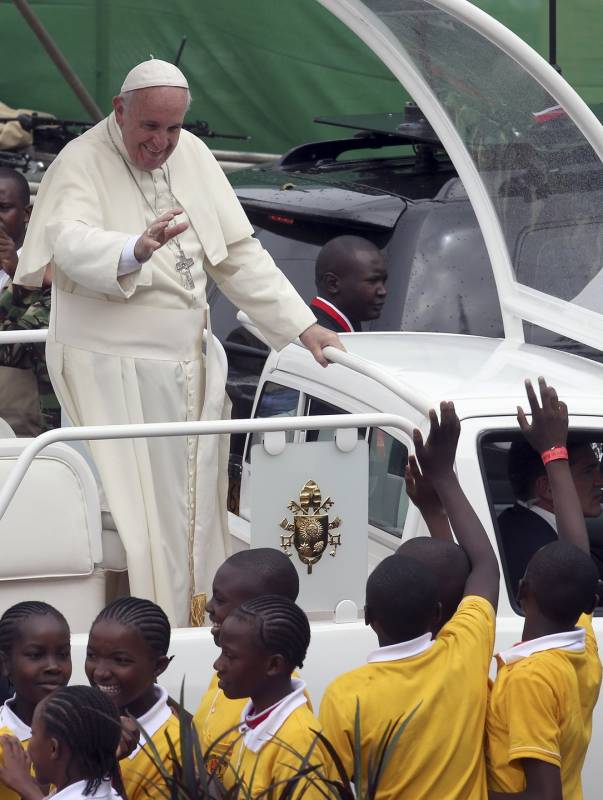 On the 27th, the last day in Nairobi, he went to Kangemi, a very poor shanty town where conditions of human and environmental downgrade have amassed, and which had specifically pushed him to denounce this situation of Kangemi before the UN. He was met there by 100,000 people who waited to welcome him with dances and songs. And Francis did not disappoint them: “I feel at home,” he said. “I share this moment with you brothers and sisters who have a special place in my life and in my choices. I feel your sufferings deeply. I know the pain you bear. How can we not denounce the injustice suffered?” Before leaving for Uganda, he met the youth in the Kasarani stadium to answer all their questions, such as: how to overcome tribalism, corruption, and enrolment of the youth. “Overcoming tribalism – he replied – is a daily task, a job for one’s ears in listening to the others, a task for the heart in opening it to the others, and a labour of the hand in reaching out towards one another.” He added that, “Corruption is something that creeps into our hearts like sugar which is sweet, pleasant, and easy to take, but then we end up in trouble.” And how can radicalisation be overcome? “The first thing we must do to prevent the enrolment of a young person is to offer education and employment.” Each of his meetings overflows with affection, closeness and love. And the people responded with gratitude, joy, and hope. Inculturation of the Gospel is one of the most important challenges in these lands and we must take into account the aspects perceived as values that pre-existed before Christianity: the vision of the family, the role of the clans, tribes, polygamy, and that of the Muslims, etc. It is a challenge which also the Focolare has faced ever since it came to Africa in the 1960s, and which it continues to sincerely undertake with the people of the place, in the spirit of reciprocity. A journey led Chiara Lubich in 1992 to found, precisely in Nairobi, a little town of witness, where specific inculturation courses are held. The next one will be held in May 2016, with the participation also of Maria Voce and Jesús Morán, President and Co-President, respectively. Watch video of the foundation of Mariapolis Piero
On the 27th, the last day in Nairobi, he went to Kangemi, a very poor shanty town where conditions of human and environmental downgrade have amassed, and which had specifically pushed him to denounce this situation of Kangemi before the UN. He was met there by 100,000 people who waited to welcome him with dances and songs. And Francis did not disappoint them: “I feel at home,” he said. “I share this moment with you brothers and sisters who have a special place in my life and in my choices. I feel your sufferings deeply. I know the pain you bear. How can we not denounce the injustice suffered?” Before leaving for Uganda, he met the youth in the Kasarani stadium to answer all their questions, such as: how to overcome tribalism, corruption, and enrolment of the youth. “Overcoming tribalism – he replied – is a daily task, a job for one’s ears in listening to the others, a task for the heart in opening it to the others, and a labour of the hand in reaching out towards one another.” He added that, “Corruption is something that creeps into our hearts like sugar which is sweet, pleasant, and easy to take, but then we end up in trouble.” And how can radicalisation be overcome? “The first thing we must do to prevent the enrolment of a young person is to offer education and employment.” Each of his meetings overflows with affection, closeness and love. And the people responded with gratitude, joy, and hope. Inculturation of the Gospel is one of the most important challenges in these lands and we must take into account the aspects perceived as values that pre-existed before Christianity: the vision of the family, the role of the clans, tribes, polygamy, and that of the Muslims, etc. It is a challenge which also the Focolare has faced ever since it came to Africa in the 1960s, and which it continues to sincerely undertake with the people of the place, in the spirit of reciprocity. A journey led Chiara Lubich in 1992 to found, precisely in Nairobi, a little town of witness, where specific inculturation courses are held. The next one will be held in May 2016, with the participation also of Maria Voce and Jesús Morán, President and Co-President, respectively. Watch video of the foundation of Mariapolis Piero
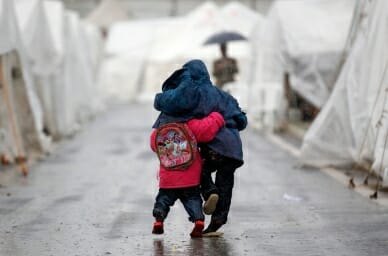
Nov 27, 2015 | Focolare Worldwide

Photo: REUTERS/Murad Sezer
“While the mortar shells are falling near us, fear and worry assail us both for our lives and for the lives of those we know, Christians or Muslims, Syrians or foreigners: our common bond is our humanity, our being brothers and sisters. On the streets of Damascus we live and die together, without distinction.
The death toll of the bombing is tragic: 9 dead and 52 injured. Yet no one speaks of it. For now, Paris has the spotlight. But these are the statistics of the war on the other side of the Mediterranean, these are the statistics of today. I don’t want to intensify the horrifying nature of what is a normal daily reality for everyone. As soon as the din settles, because the noise of the bombs is deafening, I grab my cell phone and call my family and friends: “Are you ok? Where are you? Don’t move! Wait there… .” These are the recurring questions after every bombing or neighborhood shooting. We advise each other to remain where we temporarily found shelter and safety, and there we stay, not knowing where to go. The office, the kitchen, or the hall become shelters or tombs, depending on whether the bombs missed you or hit you. The questions in my head persist, like a mantra: ‘Is it normal to live with this anxiety? Is it normal that people have to live in fear, always? Why does the other side of the world keep silent? How long must this absurdity last? Is it possible that power, money, and profit can defeat the desire for peace common among peoples and communities?’ At the beginning of November, Aleppo remained 15 days without food or supplies, and all access roads were closed. The mines are another of the legacies left by this war. Each transit route must be de-mined before reopening it. A village near Homs was targeted by ISIS and there are about 3,000 displaced persons. The people want the war to end and are full of questions: ‘Who supplies the weapons to this cruel militia? Why do ammunition and explosives arrive, but no food?’ These questions lacerate us, while prayer becomes a balm, our rock. The Christian community seeks to live with a sense of normalcy, meeting for celebrations, working at many solidarity projects, but we are few. People depart inexorably, leaving a beloved homeland because they have no prospects and everything is costly, from medicines to food. But even those who leave want to return: their life is spared, but it isn’t the same as life in Syria, nor the same relationships, nor the same tastes, nor the same complicity. And yet we are not divided. We are scattered, but we continue to live together for the same peace.” Source: Città Nuova
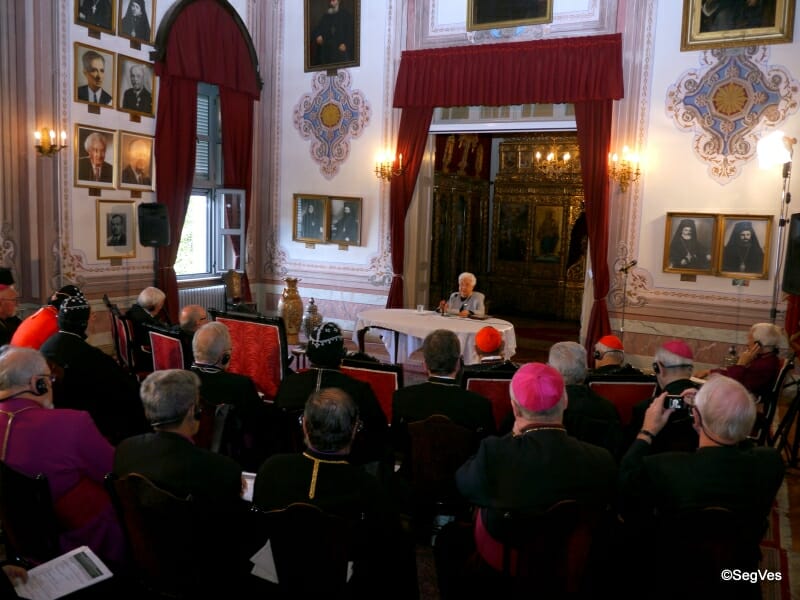
Nov 27, 2015 | Focolare Worldwide
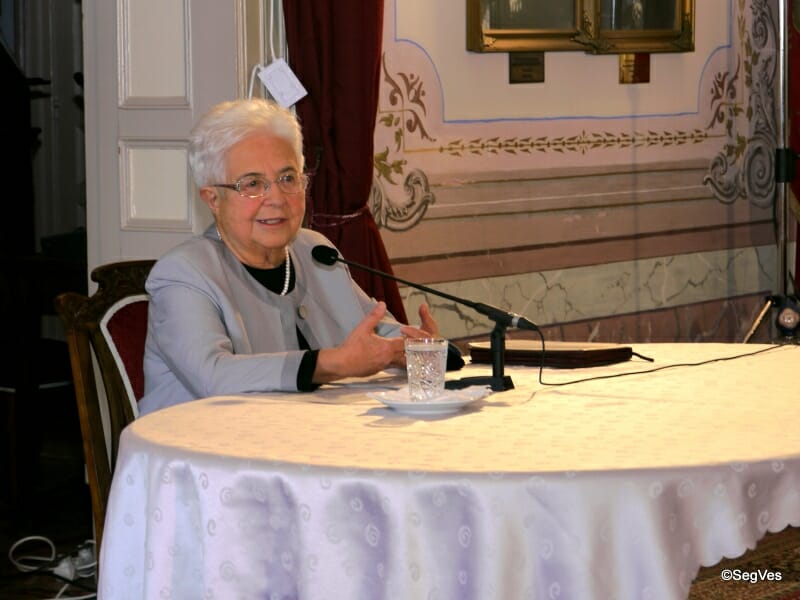 In the present context it may seem absurd or anachronistic to speak of unity. And yet the motivation which animates the bishops present at the Ecumenical Convention on the island of Heybeliada (Halki) is anything but a utopia. Their commitment to live reciprocal love among themselves and with their churches is already a vital testimony for anyone who has lost hope in dialogue and peace. On November 25th, Maria Voce spoke to the bishops about unity in her programmatic speech. Unity is not only a gift from on high, but also becomes an impelling commitment which, she assures us, allows us to “insert ourselves into the sacred history of humanity.” A sacred story in which Christians have an essential role. Unity becomes a response to the challenges of today. “In the face of powerlessness, which at times assails us even today,” she continues, “perhaps we need to take a single first step: to give ourselves to God as instruments in his hands, because he builds unity upon our nothingness. This is our first obligation, the first step we must take singularly and together.” With the dramatic social problems of today, many people, especially the young, feel the need to be visibly present next to those who suffer. But the Focolare Movement’s task does not finish here. One must understand that unity is an objective towards the goal of a united world. “We are called to unity with all, excluding no one,” stresses Maria Voce. Citing various excerpts by Chiara Lubich, she reveals to the bishops the way discovered by the Focolare foundress. “For us, the door which leads to unity is Jesus Crucified and Forsaken,” which “carried out the reunification of the human race with the Father and among men and women, and it is He, crucified and forsaken, the key to unity, which he will fulfill even today.”
In the present context it may seem absurd or anachronistic to speak of unity. And yet the motivation which animates the bishops present at the Ecumenical Convention on the island of Heybeliada (Halki) is anything but a utopia. Their commitment to live reciprocal love among themselves and with their churches is already a vital testimony for anyone who has lost hope in dialogue and peace. On November 25th, Maria Voce spoke to the bishops about unity in her programmatic speech. Unity is not only a gift from on high, but also becomes an impelling commitment which, she assures us, allows us to “insert ourselves into the sacred history of humanity.” A sacred story in which Christians have an essential role. Unity becomes a response to the challenges of today. “In the face of powerlessness, which at times assails us even today,” she continues, “perhaps we need to take a single first step: to give ourselves to God as instruments in his hands, because he builds unity upon our nothingness. This is our first obligation, the first step we must take singularly and together.” With the dramatic social problems of today, many people, especially the young, feel the need to be visibly present next to those who suffer. But the Focolare Movement’s task does not finish here. One must understand that unity is an objective towards the goal of a united world. “We are called to unity with all, excluding no one,” stresses Maria Voce. Citing various excerpts by Chiara Lubich, she reveals to the bishops the way discovered by the Focolare foundress. “For us, the door which leads to unity is Jesus Crucified and Forsaken,” which “carried out the reunification of the human race with the Father and among men and women, and it is He, crucified and forsaken, the key to unity, which he will fulfill even today.”  The task which the Focolare Movement poses is to bring the richness of unity to every corner of the world, to awaken life everywhere. “In the refugee camps, ” continues Maria Voce, “in the hospitals for the wounded by war, in the public demonstrations, in the queues of people looking for work and finding none, in the ports crowded with immigrants…everywhere, everywhere, God is asking us to light ever-greater flames.” In the subsequent dialogue several bishops related their actions in difficult situations, and the solidarity of the faithful of different churches wherever there is war and suffering. They have a strong certainty that the cross of Jesus is the common bond between them and will make lively communities blossom in the most unthinkable places. The program then took a particular look at the situation of the local churches in the Middle East, the role of Christians and their difficulties. Bishop Sahak Maşalyan, despite the complex situation of the Armenian Church in Turkey, spreads optimism, and asserts: “When Christians lose their sense of optimism, in the end they emigrate to some other place.” An appeal was also made by Bishop Simon Atallah, of the Maronite Church of Lebanon. He asked all to pray with fervor to end the war, so that Christians would not abandon their lands and could return to living in peace and harmony. At the end of the day Angela Caliaro e Carmine Donnici, representatives of the Movement, spoke about the development and the influence of the Focolare in the whole Middle Eastern area; a seed of hope which engages Christians, Muslims, and Jews and encourages them to continue on the road to reconciliation and peace. From correspondent Adriana Avellaneda
The task which the Focolare Movement poses is to bring the richness of unity to every corner of the world, to awaken life everywhere. “In the refugee camps, ” continues Maria Voce, “in the hospitals for the wounded by war, in the public demonstrations, in the queues of people looking for work and finding none, in the ports crowded with immigrants…everywhere, everywhere, God is asking us to light ever-greater flames.” In the subsequent dialogue several bishops related their actions in difficult situations, and the solidarity of the faithful of different churches wherever there is war and suffering. They have a strong certainty that the cross of Jesus is the common bond between them and will make lively communities blossom in the most unthinkable places. The program then took a particular look at the situation of the local churches in the Middle East, the role of Christians and their difficulties. Bishop Sahak Maşalyan, despite the complex situation of the Armenian Church in Turkey, spreads optimism, and asserts: “When Christians lose their sense of optimism, in the end they emigrate to some other place.” An appeal was also made by Bishop Simon Atallah, of the Maronite Church of Lebanon. He asked all to pray with fervor to end the war, so that Christians would not abandon their lands and could return to living in peace and harmony. At the end of the day Angela Caliaro e Carmine Donnici, representatives of the Movement, spoke about the development and the influence of the Focolare in the whole Middle Eastern area; a seed of hope which engages Christians, Muslims, and Jews and encourages them to continue on the road to reconciliation and peace. From correspondent Adriana Avellaneda
Nov 26, 2015 | Focolare Worldwide
![Pope Francis: a pilgrim of peace in Africa]()
Nov 25, 2015 | Focolare Worldwide
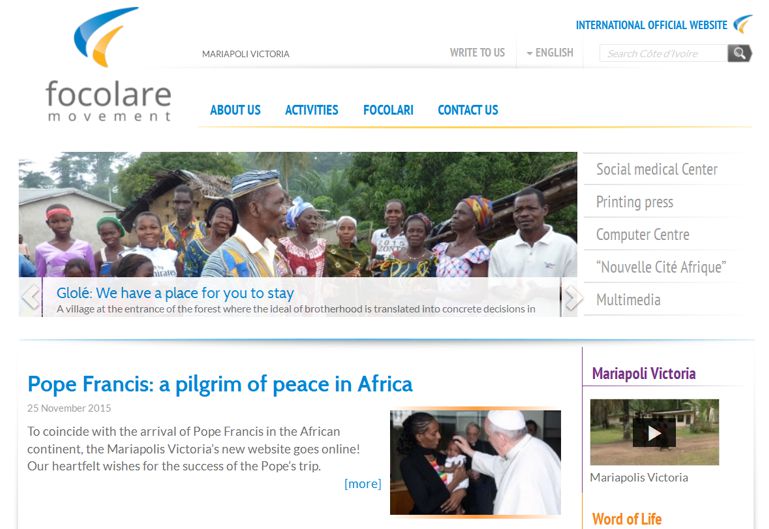 Today Pope Francis sets out on his first trip to Africa where he will be visiting Kenya and Uganda (English-speaking nations) and the Central African Republic (a French-speaking nation). It’s a particularly delicate and significant time in the Central African Republic due to it’s security situation being a country at war. “Mariapolis Victoria”, the Focolare’s little town located in the Ivory Coast, extends its best wishes for this trip and has timed the launching of its new website today to coincide with this meaningful journey of the Pope in Africa . Although West Africa is not on Pope Francis’ itinerary, we totally adhere to his message of brotherhood and peace. Many nations in West Africa, such as Mali, Niger and Nigeria, have suffered repeated attacks of terrorism. We sincerely hope that the presence of Pope Francis, which promotes dialogue, in particular interreligious dialogue, may open up pathways of fraternity in Africa. “Bon voyage” Pope Francis! Source : www.focolare.org/mariapolivictoria
Today Pope Francis sets out on his first trip to Africa where he will be visiting Kenya and Uganda (English-speaking nations) and the Central African Republic (a French-speaking nation). It’s a particularly delicate and significant time in the Central African Republic due to it’s security situation being a country at war. “Mariapolis Victoria”, the Focolare’s little town located in the Ivory Coast, extends its best wishes for this trip and has timed the launching of its new website today to coincide with this meaningful journey of the Pope in Africa . Although West Africa is not on Pope Francis’ itinerary, we totally adhere to his message of brotherhood and peace. Many nations in West Africa, such as Mali, Niger and Nigeria, have suffered repeated attacks of terrorism. We sincerely hope that the presence of Pope Francis, which promotes dialogue, in particular interreligious dialogue, may open up pathways of fraternity in Africa. “Bon voyage” Pope Francis! Source : www.focolare.org/mariapolivictoria
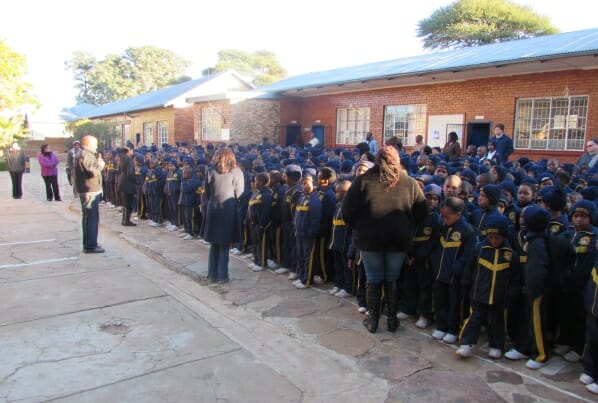
Nov 25, 2015 | Focolare Worldwide
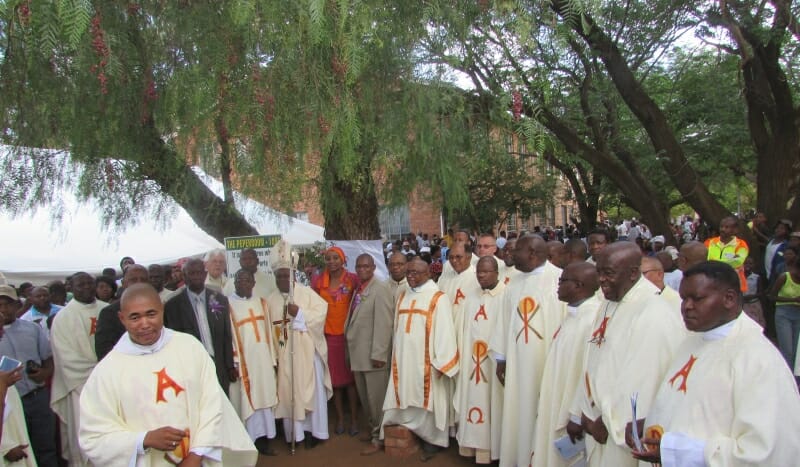 Taung forms a sole diocese with Kimberley, famous for its ancient and deactivated diamond mine. Visitors flock from all over the world to Kimberley to admire its Big Hole, the hollow that remained after the diggings, and where, surpassing the steep ravines, the bravest tourists can immerse in a really fantastic lake. But also Taung boasts its own primacy. In 1924, precisely there, the fossile of a child’s skull was found , and traced to 2.3 million years ago, a very important find for scholars and researchers, and was named the Taung Child. However, the 24 October feast was not only a geological-cultural one. Four thousand people from far-off towns and village reached Taung to celebrate the 120th anniversari of the arrival of the Catholic Church among the Tswana people of South Africa. The Prior of the Oblates and the local bishop were the honoured hosts. Also Bishop Klerksdorp and about fifty priests and religious were there. The Minister of Culture of the province represented the government. Also present was Kgosi, the traditional chief of the Tswana population – about 300,000 in all – living in the villages of Taung.
Taung forms a sole diocese with Kimberley, famous for its ancient and deactivated diamond mine. Visitors flock from all over the world to Kimberley to admire its Big Hole, the hollow that remained after the diggings, and where, surpassing the steep ravines, the bravest tourists can immerse in a really fantastic lake. But also Taung boasts its own primacy. In 1924, precisely there, the fossile of a child’s skull was found , and traced to 2.3 million years ago, a very important find for scholars and researchers, and was named the Taung Child. However, the 24 October feast was not only a geological-cultural one. Four thousand people from far-off towns and village reached Taung to celebrate the 120th anniversari of the arrival of the Catholic Church among the Tswana people of South Africa. The Prior of the Oblates and the local bishop were the honoured hosts. Also Bishop Klerksdorp and about fifty priests and religious were there. The Minister of Culture of the province represented the government. Also present was Kgosi, the traditional chief of the Tswana population – about 300,000 in all – living in the villages of Taung. 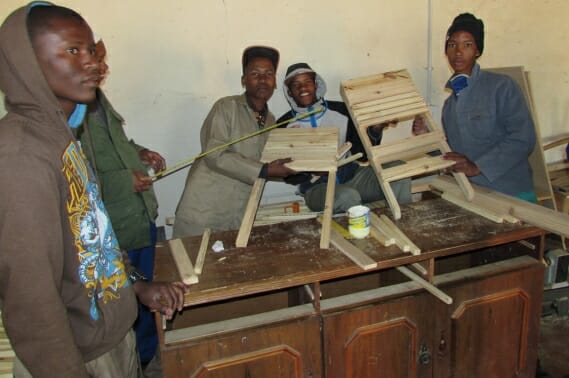 During the celebrations, great importance was given to the activities of the missions, especially those conducted by three members who live in the Focolare community: Dominic, from Cameroon, and Chris who is German and Moris from Kenya. Each of them play a key role in the mission. Dominic, who is a priest, acts as vice-parish priest. Given that he has been there for a short time, he is still learning the Tswana language, and so, during the sermon, is helped by Rapelang, father of a family who has embraced the spirituality of the Focolare and more than willingly acts as his interpreter, and often completes the sermons with his own experiences on living the Gospel. Chris has been entrusted with the two-year professional school and which certifies yearly about thirty young and promising carpenters. These are young people who had to leave for various reasons the public school, and are offered a second chance to learn a trade. Moris is the dean of the primary school with 550 students.
During the celebrations, great importance was given to the activities of the missions, especially those conducted by three members who live in the Focolare community: Dominic, from Cameroon, and Chris who is German and Moris from Kenya. Each of them play a key role in the mission. Dominic, who is a priest, acts as vice-parish priest. Given that he has been there for a short time, he is still learning the Tswana language, and so, during the sermon, is helped by Rapelang, father of a family who has embraced the spirituality of the Focolare and more than willingly acts as his interpreter, and often completes the sermons with his own experiences on living the Gospel. Chris has been entrusted with the two-year professional school and which certifies yearly about thirty young and promising carpenters. These are young people who had to leave for various reasons the public school, and are offered a second chance to learn a trade. Moris is the dean of the primary school with 550 students.  It is really impressive to see, in the morning, this throng of kids and children line up for inspection, which is performed by the assigned students themselves every time, to check the hygiene and uniform of the students. Besides a professional education the school also offers a spiritual and moral education for their personal lives. Its innovative programme and teaching style, centred on authentic values, has earned the school its reputation as a school of excellence. It is attended not only by the children of Catholic families but also of Protestants (who represent about 30% of the entire South African population) and among whom ecumenical dialogue is always open and constructive. The Catholic Mission schools, across the 100 years of activities have formed men and women of great human and professional stature, who have played key roles in society.
It is really impressive to see, in the morning, this throng of kids and children line up for inspection, which is performed by the assigned students themselves every time, to check the hygiene and uniform of the students. Besides a professional education the school also offers a spiritual and moral education for their personal lives. Its innovative programme and teaching style, centred on authentic values, has earned the school its reputation as a school of excellence. It is attended not only by the children of Catholic families but also of Protestants (who represent about 30% of the entire South African population) and among whom ecumenical dialogue is always open and constructive. The Catholic Mission schools, across the 100 years of activities have formed men and women of great human and professional stature, who have played key roles in society.

 come to Kenya, Pope). Amid festive songs and dances, the Pope landed in Nairobi in the afternoon of 25 November for the first leg in Africa. From the airport and all the way to the city, two waves of crowds accompanied the papal automobile: a simple grey car. In his first greeting Francesco expressed his love for this “young and vigorous nation, a community enriched by diversity.” “Kenya has been blessed, not only with immense beauty in its mountains, rivers, lakes, forests, savannahs and semi-deserts, but also with an abundance of natural resources.” He went on to say: “In a world that continues to exploit instead of protecting our common home,” I hope that your values inspire “the endeavours of the government in promoting models of responsible economic development.” The papal agenda is full: the meeting with the clergy, to whom he gives three key words, weep, pray, and serve; and the session with the UN representatives of Nairobi, from whom he asked for a ”change of direction” so that economy and politics could be placed at the service of the person, in order to eradicate malaria and tuberculosis, be persistent in fighting against deforestation, and target fair trade and development which takes the poor into account. The meeting with the leaders of the various Churches and Muslim and Animist communities was highly significant, and where he affirmed that ecumenical and interreligious dialogue is not a luxury or an option. He then strongly stressed that phrase which echoed throughout the world: “The holy name of God must never be used to justify hatred and violence.”
come to Kenya, Pope). Amid festive songs and dances, the Pope landed in Nairobi in the afternoon of 25 November for the first leg in Africa. From the airport and all the way to the city, two waves of crowds accompanied the papal automobile: a simple grey car. In his first greeting Francesco expressed his love for this “young and vigorous nation, a community enriched by diversity.” “Kenya has been blessed, not only with immense beauty in its mountains, rivers, lakes, forests, savannahs and semi-deserts, but also with an abundance of natural resources.” He went on to say: “In a world that continues to exploit instead of protecting our common home,” I hope that your values inspire “the endeavours of the government in promoting models of responsible economic development.” The papal agenda is full: the meeting with the clergy, to whom he gives three key words, weep, pray, and serve; and the session with the UN representatives of Nairobi, from whom he asked for a ”change of direction” so that economy and politics could be placed at the service of the person, in order to eradicate malaria and tuberculosis, be persistent in fighting against deforestation, and target fair trade and development which takes the poor into account. The meeting with the leaders of the various Churches and Muslim and Animist communities was highly significant, and where he affirmed that ecumenical and interreligious dialogue is not a luxury or an option. He then strongly stressed that phrase which echoed throughout the world: “The holy name of God must never be used to justify hatred and violence.”  On the 27th, the last day in Nairobi, he went to Kangemi, a very poor shanty town where conditions of human and environmental downgrade have amassed, and which had specifically pushed him to denounce this situation of Kangemi before the UN. He was met there by 100,000 people who waited to welcome him with dances and songs. And Francis did not disappoint them: “I feel at home,” he said. “I share this moment with you brothers and sisters who have a special place in my life and in my choices. I feel your sufferings deeply. I know the pain you bear. How can we not denounce the injustice suffered?” Before leaving for Uganda, he met the youth in the Kasarani stadium to answer all their questions, such as: how to overcome tribalism, corruption, and enrolment of the youth. “Overcoming tribalism – he replied – is a daily task, a job for one’s ears in listening to the others, a task for the heart in opening it to the others, and a labour of the hand in reaching out towards one another.” He added that, “Corruption is something that creeps into our hearts like sugar which is sweet, pleasant, and easy to take, but then we end up in trouble.” And how can radicalisation be overcome? “The first thing we must do to prevent the enrolment of a young person is to offer education and employment.” Each of his meetings overflows with affection, closeness and love. And the people responded with gratitude, joy, and hope. Inculturation of the Gospel is one of the most important challenges in these lands and we must take into account the aspects perceived as values that pre-existed before Christianity: the vision of the family, the role of the clans, tribes, polygamy, and that of the Muslims, etc. It is a challenge which also the Focolare has faced ever since it came to Africa in the 1960s, and which it continues to sincerely undertake with the people of the place, in the spirit of reciprocity. A journey led Chiara Lubich in 1992 to found, precisely in Nairobi, a little town of witness, where specific inculturation courses are held. The next one will be held in May 2016, with the participation also of Maria Voce and Jesús Morán, President and Co-President, respectively. Watch video of the foundation of Mariapolis Piero
On the 27th, the last day in Nairobi, he went to Kangemi, a very poor shanty town where conditions of human and environmental downgrade have amassed, and which had specifically pushed him to denounce this situation of Kangemi before the UN. He was met there by 100,000 people who waited to welcome him with dances and songs. And Francis did not disappoint them: “I feel at home,” he said. “I share this moment with you brothers and sisters who have a special place in my life and in my choices. I feel your sufferings deeply. I know the pain you bear. How can we not denounce the injustice suffered?” Before leaving for Uganda, he met the youth in the Kasarani stadium to answer all their questions, such as: how to overcome tribalism, corruption, and enrolment of the youth. “Overcoming tribalism – he replied – is a daily task, a job for one’s ears in listening to the others, a task for the heart in opening it to the others, and a labour of the hand in reaching out towards one another.” He added that, “Corruption is something that creeps into our hearts like sugar which is sweet, pleasant, and easy to take, but then we end up in trouble.” And how can radicalisation be overcome? “The first thing we must do to prevent the enrolment of a young person is to offer education and employment.” Each of his meetings overflows with affection, closeness and love. And the people responded with gratitude, joy, and hope. Inculturation of the Gospel is one of the most important challenges in these lands and we must take into account the aspects perceived as values that pre-existed before Christianity: the vision of the family, the role of the clans, tribes, polygamy, and that of the Muslims, etc. It is a challenge which also the Focolare has faced ever since it came to Africa in the 1960s, and which it continues to sincerely undertake with the people of the place, in the spirit of reciprocity. A journey led Chiara Lubich in 1992 to found, precisely in Nairobi, a little town of witness, where specific inculturation courses are held. The next one will be held in May 2016, with the participation also of Maria Voce and Jesús Morán, President and Co-President, respectively. Watch video of the foundation of Mariapolis Piero






